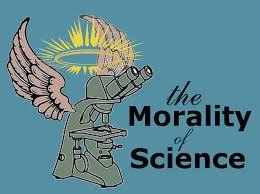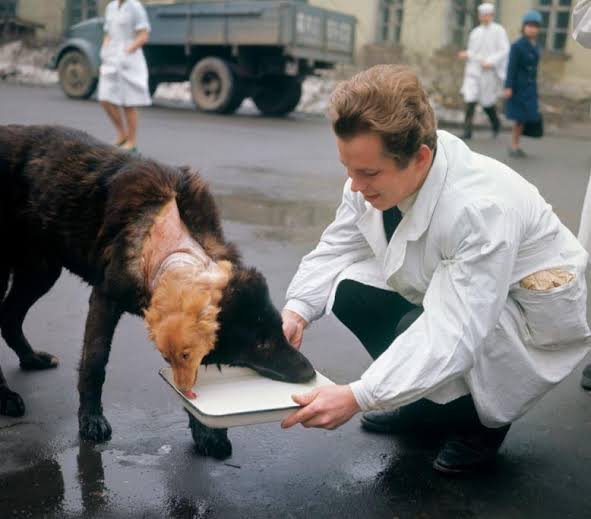THE MORALITY OF SCIENCE [ENG/ESP]

Morality is a complex concept.
One that has been the base plot between so many movies and books.
The one true line separation a villain from a hero and a sane person from the insane.
Morality is ever-changing for different people and it's varying range helps one make different difficult decisions in different situations. Morality without a doubt, for the average man, is his true guidebook.
For a man of science, morality takes on a more influential role.
I made a story a while back that touched a bit on this morality and science topic.
Like all stories, I try to emulate or rather describe my thoughts on the matter, using the characters and the situations.
To be exact, at that time, I had an inkling of the boundaries morality had in science, yet I didn't know just how indepth the story went, or at least people who read it thought they went.
Through comments from @theinkwell and @gracielaacevedo, I was left thinking idly on this topic.
Since March 24th, till now, fate -cause yes, I do believe in fate- has brought me upon numerous questions on morality and science.
The most shocking, stimulating and rather baffling is the topic of the mad scientist.
Doctor Vladimir Demikhov and his series of Two Headed Dogs

This is a topic that may be troubling for most, shocking for others and rather interesting and quite curious for the weird. (P.S I'm weird : D)
Doctor Vladimir Demikhov was a Soviet-Russian Scientist and organ transplant doctor.. quite skilled in his trade actually, having earned some medals in military too.
Yet he's best known for the gory bits of his life.
Vladimir Demikhov, is the doctor who first successfully -as successful as one could get- created a two headed dog.
These creations of his, made in a sterilized environment, wasn't because he had a weird fetish or favor for severe animal cruelty. Infact, it was valuable research and experiments which paved way for the percentage of success in organ transplants that we have now.
His first experiment, was about the heart.
It's quite possible that this was the main experiment too as details are still a bit sketchy.
He wondered if a dog could have two hearts. Going through with that, he then wondered if one heart could support ttwo dog heads.
To experiment so, he successfully popped off the head of a puppy and attached it to the back of the neck of another fully grown dog.
It worked.
The two heads were alive and working, although issues arrived later on...more
There were numerous more experiments like that, and which such experiments very few success rates and always the mortality rate was high.
Some dog pairs not lasting more than 5 hours and the most lasting a month.
The question of morality is questioned here.
Does the means worth the cost?
So many lives lost... Or is it easier as they aren't human lives?
Morality like I firstly mentioned is a line that measures different distances for different people.
Demikhov surely met resistance. Maybe from his team, maybe passerbys, probably even family.
For they couldn't understand nor foretell the gravity of his research.
Of course Demikhov is an exception and you might always run into the occasional mad scientist who discards morals in order to fulfill his own personal pleasure.
Tbe philosophy of science is to create, to improve and to reform.
To do this one has to make certain experiments which could lead to certain ethical and non-ethical situations.
I feel when Morality in science fully comes into play is when a scientist is not stopping because it's bad but feeling that it's bad, regretting that it is, but with a clear sight of the greater good, pushing through with it, unwavering until you get your goal.
At least these are just my thoughts on it..
This is made in response to the June in Leo Monthly Prompt. Day 10
The header image was gotten from a blog post which coincidentally had the same topic and spoke of the same things I said, although with different examples and different points to share. I saw it just after I finished writing mine and decided to borrow the image. Here's the post
- For those further interested in Dr Vladimir Demikhov work, can click this link to download and listen to the podcast from BBC
ESPANOL

La moralidad es un concepto complejo.
Una que ha sido la trama base entre tantas películas y libros.
La única línea verdadera separa a un villano de un héroe y a una persona cuerda de un loco.
La moralidad cambia constantemente para diferentes personas y su rango variable ayuda a uno a tomar diferentes decisiones difíciles en diferentes situaciones. La moralidad, sin duda, para el hombre medio, es su verdadera guía.
Para un hombre de ciencia, la moralidad adquiere un papel más influyente.
Hace un tiempo hice una historia que tocaba un poco este tema de moralidad y ciencia.
Como todas las historias, trato de emular o más bien describir mis pensamientos sobre el tema, utilizando los personajes y las situaciones.
Para ser exactos, en ese momento tenía una idea de los límites que tenía la moralidad en la ciencia, pero no sabía cuán profunda era la historia, o al menos las personas que la leían pensaban que llegaban.
A través de comentarios de @theinkwell y @gracielaacevedo, me quedé pensando de brazos cruzados sobre este tema.
Desde el 24 de marzo hasta ahora, el destino -porque sí, creo en el destino- me ha traído a numerosas preguntas sobre moralidad y ciencia.
El más impactante, estimulante y bastante desconcertante es el tema del científico loco.
El doctor Vladimir Demikhov y su serie de Perros de dos cabezas

Este es un tema que puede resultar inquietante para la mayoría, impactante para otros y bastante interesante y bastante curioso para los extraños. (P.D. Soy raro :D)
El doctor Vladimir Demikhov era un científico ruso-soviético y médico especialista en trasplantes de órganos. En realidad, era bastante hábil en su oficio y también había obtenido algunas medallas en el ejército.
Sin embargo, es mejor conocido por los momentos sangrientos de su vida.
Vladimir Demikhov, es el médico que por primera vez creó con éxito (todo el éxito posible) un perro de dos cabezas.
Estas creaciones suyas, realizadas en un ambiente esterilizado, no se debían a que tuviera un fetiche extraño o un favor por la crueldad animal severa. De hecho, fueron investigaciones y experimentos valiosos los que allanaron el camino para el porcentaje de éxito en los trasplantes de órganos que tenemos ahora.
Su primer experimento fue sobre el corazón.
Es muy posible que este también fuera el experimento principal, ya que los detalles aún son un poco incompletos.
Se preguntó si un perro podría tener dos corazones. Al continuar con eso, se preguntó si un corazón podría sostener dos cabezas de perro.
Para experimentarlo, arrancó con éxito la cabeza de un cachorro y la unió a la nuca de otro perro adulto.
Funcionó.
Las dos cabezas estaban vivas y trabajando, aunque los problemas llegaron más tarde...más
Hubo muchos más experimentos como ese, y dichos experimentos tuvieron muy pocas tasas de éxito y siempre la tasa de mortalidad fue alta.
Algunas parejas de perros no duran más de 5 horas y la mayoría dura un mes.
Aquí se cuestiona la cuestión de la moralidad.
¿Vale la pena el costo de los medios?
Tantas vidas perdidas... ¿O es más fácil al no ser vidas humanas?
La moralidad, como mencioné al principio, es una línea que mide diferentes distancias para diferentes personas.
Seguramente Demíjov encontró resistencia. Quizás de su equipo, quizás de los transeúntes, probablemente incluso de su familia.
Porque no podían comprender ni predecir la gravedad de su investigación.
Por supuesto, Demikhov es una excepción y siempre es posible que te encuentres con algún científico loco que descarta la moral para satisfacer su propio placer personal.
La filosofía de la ciencia es crear, mejorar y reformar.
Para ello hay que realizar ciertos experimentos que podrían conducir a determinadas situaciones éticas y no éticas.
Siento que cuando la moralidad en la ciencia entra plenamente en juego es cuando un científico no se detiene porque sea malo sino que siente que es malo, se arrepiente de que lo sea, pero con una visión clara del bien mayor, sigue adelante, inquebrantable hasta consigues tu objetivo.
Al menos estos son sólo mis pensamientos al respecto.
Esto se hace en respuesta al mensaje mensual Junio en Leo. Día 9](https://inleo.io/threads/view/leogrowth/re-leothreads-gjpcnuhb)
La imagen del encabezado fue obtenida de una publicación de blog que casualmente tenía el mismo tema y hablaba de las mismas cosas que dije, aunque con diferentes ejemplos y diferentes puntos para compartir. Lo vi justo después de terminar de escribir el mío y decidí tomar prestada la imagen. Aquí está la publicación
- Para aquellos interesados en el Dr. Vladimir Demikhov trabaja, puede hacer clic en este enlace para descargar y escuchar el podcast de la BBC


My Instagram page.
Posted Using InLeo Alpha
hmm, this is indeed deep, I also believe some greater good is achieved through the process of sacrifice, it might not be morally right for some people but that's the line we can't all have the same perspective on. But if the experiment the scientist is involved in is just to satisfy his craze, then it is totally unacceptable.
I'm afraid I disagree with you, my young friend.
Who is to determine what the higher good is? In the U.S. we used to sterilize people who had epilepsy--a higher good, because epileptics were considered genetically flawed. The Nazis euthanized the disabled--a higher good, for the same reason as the U.S. sterilization.
It might safely be assumed that those in power will always see experiments that serve their interests as the higher good. No, we can't leave that to subjective judgement. I don't believe we should encourage scientists to push "through with it, unwavering until you (they) get your (their) goal". I shudder to think of a world where scientists do not have to answer to external judgement (rules) but can decide on their own what is 'good' or 'bad'.
An interesting, thought-provoking blog 🌷
I guess in both cases where you mentioned above, it all boils down to the ignorance of the two parties in such matters.
And if the goal is a benefit to the rest of humanity?
Nice to hear from you, sorry the reply is a bit late.
That is exactly the point of my comment. If we leave decisions about the appropriateness of research to scientists, then the decisions are vulnerable to their ignorance, bias, and even malice.
Without an objective framework within which to frame these decisions, horrible things can and have happened. Should we euthanize disabled infants, because their lives will be difficult and they will be a burden to society? Should we harvest the organs of the poor for use by the wealthy, because the wealthy 'contribute' more to society? Should we use humans as experimental subjects (against their will), because in the long run the experiments will benefit society? If we use humans, are there limits? For example, can we investigate pain thresholds by subjecting humans to surgery without anesthesia to see how much pain medication is necessary?
All the suggestions I offer above are based on history, on ideas that have been floated in one community or another. Where do we draw the line? What oversight exists in the scientific community in order to prevent such violations of human rights?
Difficult questions, I believe.
Quite difficult questions...
One that I have no answer to, but I will ponder on ..